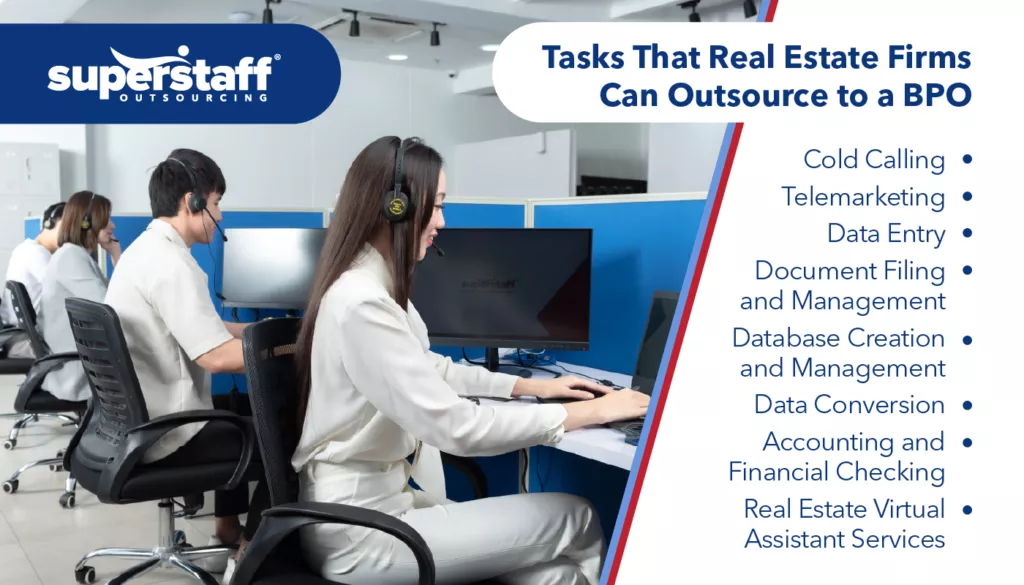
The real estate industry is no stranger to challenges.
From rising inflation to recessionary threats, economic uncertainties continue to pose significant challenges for real estate. Labor shortages and supply chain disruptions have also added strain to the market, making it crucial for firms to explore new strategies to drive resilience in the post-pandemic era.
In a harsh business climate where agility is crucial for success, firms can gain a competitive edge by harnessing the power of real estate BPO services for enhanced productivity and reduced costs.
State of the Real Estate Industry in 2023

Rising inflation continues to impact real estate values.
Real estate is one of the industries hardest hit by inflation. As prices soared across various sectors, the value of properties also skyrocketed, fuelling concerns among housing experts who closely track economic indicators.
One significant consequence of rising inflation is that it significantly limits consumer spending. As necessities become more expensive, consumers have less disposable income for big-ticket purchases such as cars, gadgets, and real estate.
Robert Frick, the corporate economist at Navy Federal Credit Union, emphasized the need for more significant price reductions to stimulate market activity.
The widespread adoption of remote work is driving down demand for commercial real estate.
The COVID-19 pandemic has brought about significant changes in how we work, with remote work becoming the new norm for many professionals. The shift profoundly impacted the demand for commercial real estate, as fewer workers regularly returned to traditional office spaces.
Before the pandemic, going into the office was a daily routine for workers, but the current scenario paints a different picture. Less than half of workers enter an office daily, prompting leading tech firms and investment banks to issue return-to-office ultimatums.
However, the sentiment among most workers is clear – they prefer the comfort of remote work over the rigorous office commute.
The trend’s implications are far-reaching, with industry insiders pointing out that a significant portion (10-20%) of existing office real estate stock needs to be repurposed or removed from the market. Due to the reduced demand for traditional office spaces, landlords and property owners must adapt to meet tenants’ changing needs and expectations.
Labor shortages and supply chain disruptions are hindering the real estate market’s recovery.
Real estate also felt the brunt of the ongoing labor shortages and supply chain disruptions that plague businesses worldwide.
One of the industry’s most significant challenges is the shortage of skilled labor, with a vast majority (88%) of contractors reporting moderate to high levels of difficulty hiring. Meanwhile, 35% have already turned down work due to the shortage, fueling delays in construction projects and rising costs.
Supply chain disruptions have also impacted the industry. Since the world’s economies have become increasingly interconnected, businesses have become more reliant on others’ ability to maintain supply chain harmony. However, recent disruptions, such as the pandemic and the Russia-Ukraine conflict, have made it difficult for developers to source materials for real estate projects.
What can real estate companies do to navigate these uncertain times?
One strategic and cost-efficient option is BPO services. Real estate firms can address labor shortages, mitigate the impact of inflation, overcome supply chain disruptions, and embrace remote work trends with the right BPO partner.
By leveraging the deep expertise and resources of BPOs, firms can ensure operational continuity, cost optimization, and optimal productivity. It’s a move that helps businesses adapt, thrive, and position themselves for long-term success in a rapidly evolving industry.
Top 8 Essential BPO Tasks for Real Estate Services to Help You Remain Competitive in the Post-Pandemic Era

What are BPO services in real estate?
#1: Cold Calling
Since buying or selling property is a significant financial decision, clients often seek guidance and support from agents they trust – and while building that trust may take time, creating a good impression through strategic cold-calling is sure to make all the difference.
Cold-calling is often the first step in lead generation. As the initial touchpoint, it sets the tone for your sales team and paves the way for solid client relationships.
One of its key advantages is immediate feedback. Agents engage with clients in real time, allowing them to address concerns, gauge interest, and tailor their services accordingly. These meaningful interactions also offer valuable insights into market trends, customer preferences, and potential opportunities that can help a real estate’s marketing efforts.
While cold-calling is not an instant sale guarantee, it lays the foundation for future business opportunities.
As customer service experts, BPOs have trained and experienced agents who understand the intricacies of effective cold-calling techniques. They use market research and a targeted approach to close in on prospects, then personalize their pitch to give you a much-needed competitive edge in the cutthroat market.
#2: Telemarketing
While telemarketing can be challenging in any industry, real estate poses unique challenges that make outbound marketing even harder.
Real estate transactions involve significant financial investments and complex legal considerations, so telemarketers are expected to understand the real estate market better to provide accurate and informative responses. They must also navigate various legal and compliance regulations, including Do Not Call (DNC) lists and privacy policies.
Additionally, since real estate is a big-ticket purchase driven by many emotional factors, they also need to establish trust and address any anxieties prospects may have.
Despite these challenges, effective telemarketing has a big payoff as it contributes to lead generation, market analysis, and client engagement.
By making outbound calls, telemarketers create interest and drive potential sales. They also empower property owners to make a short sale by offering compelling property evaluations based on market prices.
But their role goes beyond simply making calls. Telemarketers also act as advisors, guiding both potential clients and property owners.
A reliable BPO company leverages specialized telemarketing strategies to help real estate businesses reach broader demographics and create more sales opportunities. Their personalized customer service approach ultimately fuels the growth and success of realtors in this highly competitive industry.
#3: Data Entry
Data dictates the delicate balance of the volatile housing market from home equity to local property values.
It provides valuable insights to guide the decisions of businesses and clients. For instance, data plays a vital role in pricing and valuation. The comparative market analysis enables realtors to determine property values and set competitive prices based on similar properties.
Investors also leverage data to make critical business decisions. Real estate data provides insight into historical performance and economic indicators, allowing them to evaluate the viability and profitability of different investment opportunities.
Moreover, data analysis enables an asset manager to forecast future market conditions and trends. By analyzing historical data and economic indicators, they can predict shifts in demand, pricing trends, and areas of growth or decline.
Given the importance of data in virtually all aspects of the industry, real estate agencies must exercise caution to avoid costly mistakes in data entry. One way to do so is by entrusting their data entry to certified experts.
Equipped with the necessary resources to handle large volumes of data, BPO professionals follow industry best practices to maintain data integrity and reduce the likelihood of misguided business decisions fuelled by errors.
#4: Document Filing and Management
In the bustling world of real estate, paperwork is an inescapable reality.
Real estate firms deal daily with stacks of paperwork, from legal forms to property brochures, contracts, and agreements. Sorting through a multitude of documents can quickly drain resources and impede productivity.
But while efficient document management is crucial for real estate firms to stay organized and optimize operations, document management is not just a matter of convenience — it’s a legal requirement.
Real estate professionals must adhere to strict regulations regarding document retention. For instance, the California Business & Professions Code stipulates that licensed real estate brokers must retain copies of records such as listings, receipts, trust records, and other relevant documents. Failure to comply would result in severe consequences, such as license revocation or suspension by the Bureau of Real Estate.
Maintaining proper document retention practices ensures compliance with regulatory requirements and mitigates legal and financial risks. By securely organizing documents, real estate firms can demonstrate transparency, protect themselves from potential litigation, and maintain a solid operational foundation.
Outsourcing is also a great way to streamline and optimize your document management. Outsourcing enables efficient data management by tapping into the expertise of specialized professionals and leveraging advanced technologies. This approach lets you focus on your core business while ensuring high-quality, secure, scalable data management practices.
#5: Database Creation and Management
A well-maintained database is vital in real estate. It is a centralized hub for managing contacts, tracking communication, and leveraging valuable insights to enhance marketing efforts and cultivate strong business relationships.
At its core, a real estate database is a repository of everyone you’ve interacted with throughout your career, encompassing prospects, past clients, professional networks, and project collaborators.
It lets you track your correspondences to personalize future interactions – demonstrating attentiveness, cultivating trust, and fostering stronger connections.
A comprehensive database also provides insights into clients’ preferences, interests, and needs. With this knowledge, you can tailor your marketing and sales efforts, delivering targeted messages and offerings that resonate with each individual.
It can also help you quickly identify potential referrals and maintain touchpoints. By nurturing these relationships and providing excellent service, you increase the likelihood of getting referrals, expanding your network, and growing your business.
However, adding this task to a busy workload can overwhelm in-house agents. Rather than hiring additional staff to handle your database, outsourcing provides a cost-effective alternative. BPO providers employ professionals with expertise in database management, organization, and security protocols who can ensure accurate and efficient handling of your database.
#6: Data Conversion
Gone are the days when real estate decisions were made based on hunches and guesswork.
The advent of big data has ushered in a new era of precision, empowering industry professionals with valuable information to guide their strategies. However, to harness the full potential of data analysis, it is essential to convert manual data into a digital format through a process known as data conversion.
As real estate organizations accumulate vast amounts of data over the years, this conversion streamlines their database, improves accessibility, and facilitates efficient sharing. Redundant data can be identified and segregated, while essential data can be categorized based on relevance, year, or nature of use. This digitization exercise optimizes data management and provides a solid foundation for future references, audits, accounting, and informed decision-making.
Converting unstructured manual data allows real estate stakeholders to gain deeper insights into rental costs, property sale prices, market trends, and customer preferences. It also opens the doors for more effective marketing campaigns. Realtors can tailor their messaging and offerings to specific target markets by understanding customer needs.
Data conversion may be a game changer in market analytics. However, setting up an in-house data conversion infrastructure can be costly, requiring software, hardware, and training investments.
By partnering with experienced outsourcing providers, real estate firms can streamline operations, improve data accessibility, and make informed decisions based on accurate and well-organized data.
#7: Accounting and Financial Checking
Accounting is at the heart of any successful real estate firm.
Business owners gain a comprehensive overview of their cash flow by meticulously documenting rental income, property maintenance costs, insurance premiums, and other relevant financial transactions.
Accounting also plays a crucial role in ensuring tax compliance for real estate. Property owners and managers must accurately calculate and report their taxable income, deductions, and credits to meet their tax obligations.
Beyond compliance and audit readiness, real estate accounting is a valuable tool for financial planning and decision-making for growth and profitability. It explains revenue streams, expenses, and financial ratios, empowering business owners to optimize their investment portfolios and capitalize on emerging opportunities.
While all real estate firms need suitable accounting measures, only some firms have the resources to maintain an in-house accounting team. Fortunately, there is a cost-effective solution available: outsourcing accounting services.
BPOs allow firms to tap into the expertise of professional accountants without the need to hire an in-house team. By outsourcing, businesses can benefit from accurate financial reporting, tax planning strategies, and regulatory compliance, all provided by experienced professionals who are well-versed in real estate accounting practices.
#8: Real Estate Virtual Assistant Services
From managing client relationships to handling paperwork and coordinating property viewings, real estate professionals often juggle multiple tasks and responsibilities at a time.
As the industry becomes more competitive and dynamic, real estate agents and agencies turn to virtual assistants (VAs) who can provide remote administrative support, such as managing emails, scheduling appointments, preparing documents, and organizing data.
With so many moving parts in running a real estate firm, VAs can act as transaction coordinators, ensuring that all the necessary documentation, deadlines, and communication channels are effectively managed.
VAs also play a crucial role in maintaining strong client relationships by promptly responding to inquiries, scheduling property viewings, and providing updates on property listings. With their support, a real estate professional can provide a more personalized experience to clients, ensuring that their needs and preferences are satisfied.
However, hiring in-house assistants or freelance VAs may not be practical or cost-effective during quieter times. By outsourcing real estate VA services, firms can seamlessly scale up their support during peak periods without letting anyone go when demand isn’t as high.
Navigate the Housing Crunch With Real Estate BPO Services
Outsourcing is a game-changer in a cutthroat industry hounded by business challenges such as real estate. Partnering with a trusted outsourcing provider will allow you to access a wide range of specialized BPO services guaranteed to boost revenues, drive down costs, and fuel your growth.
Together, let’s revolutionize your real estate operations and unlock your full potential in the industry.
Leap and contact us today to learn more about how we can tailor our services to meet your needs and help you achieve your business goals.





